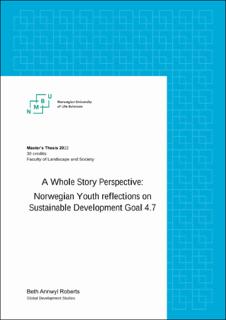| dc.contributor.advisor | Leifsen, Esben | |
| dc.contributor.author | Roberts, Beth Annwyl | |
| dc.coverage.spatial | Norway | en_US |
| dc.date.accessioned | 2022-12-14T14:16:55Z | |
| dc.date.available | 2022-12-14T14:16:55Z | |
| dc.date.issued | 2022 | |
| dc.identifier.uri | https://hdl.handle.net/11250/3037751 | |
| dc.description.abstract | Wrought with climate instability and social inequalities the future at times appears tenuous, but there is also hope. One aspect of this hope lies in the vision of the United Nations Sustainable Development Goals (SDGs) 2030 agenda, in particular goal SDG 4.7 and its core concepts of Education for Sustainable Development (ESD) and Global Citizenship Education (GCE). To ensure youth voices are both heard and utilised in future curriculum development and decision making, critical insight is needed as to how youth today perceive and reflect on the concepts of ESD and GCE. The aim of this thesis is to engage youth with a critical, integrated perspective of ESD and GCE in order to contribute both to pedagogical learning methods and curriculum development from the perspective of those who it is imparted on. Through aspects of Decolonial Theory and critical pedagogy this qualitative research engages with the ‘whole story perspective’ to mobilize youth to think outside the ‘box’ and move between marginalized and mainstream perspectives. Empirical data was collected through two interconnected workshops from three Norwegian Upper Secondary Schools involving a total of 42 students (average age 17). The findings show there is a strong sense from all the youth that a more critical, action-oriented perspective is needed and wanted. Many groups refer to critical thinking, problem solving directly and indirectly indicating the present competencies and approaches do not suffice. The results also reveal that the youth are aware that what they know is not sufficient to contribute to a sustainable and just world. While an awareness that there are other ways of seeing and acting, these are perceived as essentially beyond what they can envision and what their education provides. To conclude, this research calls for a more integrated, critical approach to the core concepts of SDG 4.7, ESD and GCE. The youth call for change, and this is where their hope lies. | en_US |
| dc.language.iso | eng | en_US |
| dc.publisher | Norwegian University of Life Sciences, Ås | en_US |
| dc.rights | Attribution-NoDerivatives 4.0 Internasjonal | * |
| dc.rights.uri | http://creativecommons.org/licenses/by-nd/4.0/deed.no | * |
| dc.subject | SDG 4.7, Decolonial Theory, Critical Pedagogy, Whole Story Perspective, Norwegian Youth | en_US |
| dc.subject | SDG 4.7 | en_US |
| dc.subject | Sustainable Development Goal 4.7 | en_US |
| dc.subject | Decolonial theory | en_US |
| dc.subject | Youth | en_US |
| dc.title | A whole story perspective : Norwegian youth reflections on Sustainable Development Goal 4.7 | en_US |
| dc.type | Master thesis | en_US |
| dc.subject.nsi | VDP::Social science: 200 | en_US |
| dc.description.localcode | M-DS | en_US |

